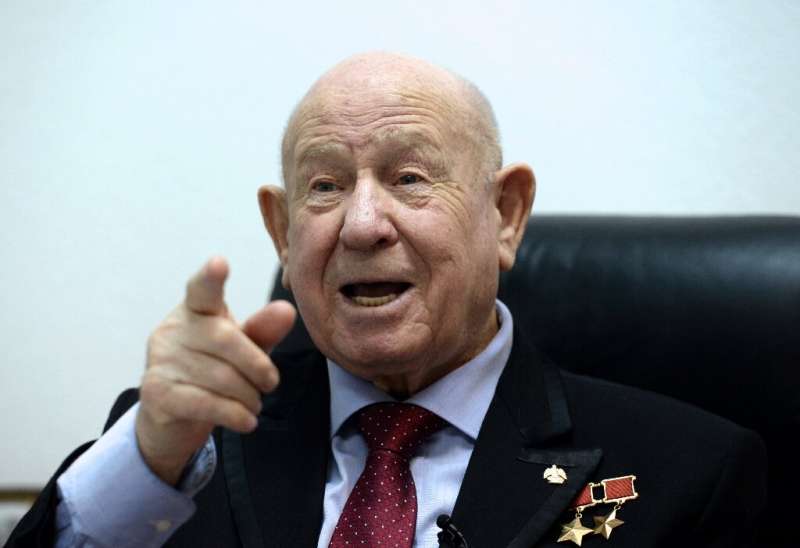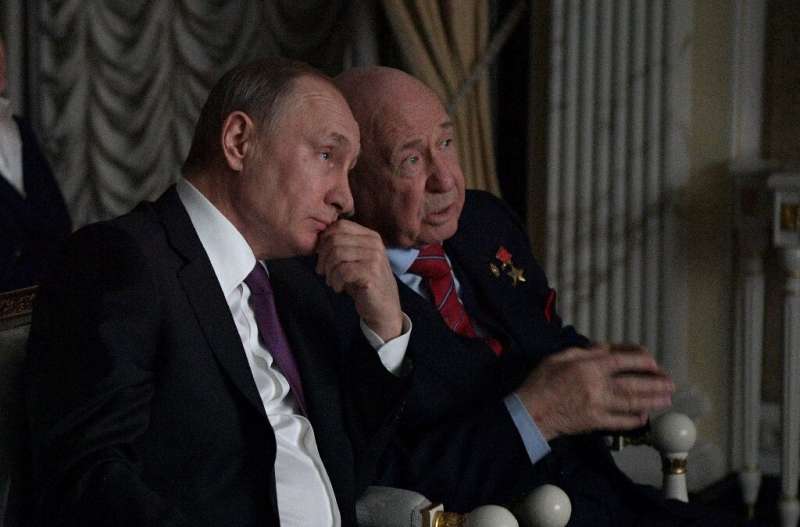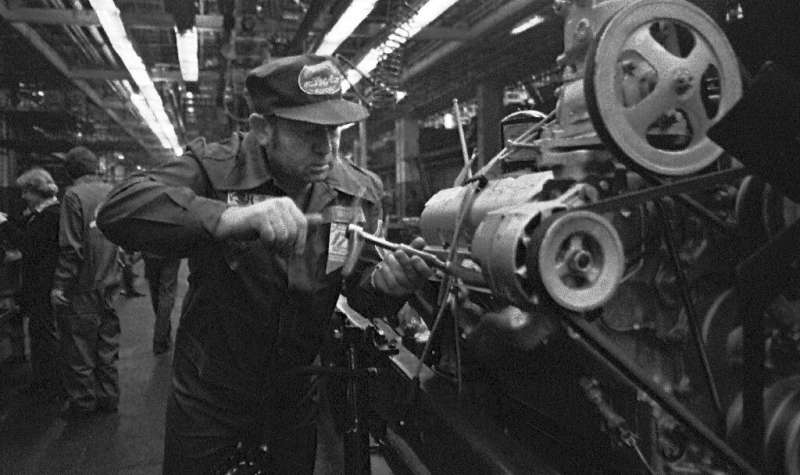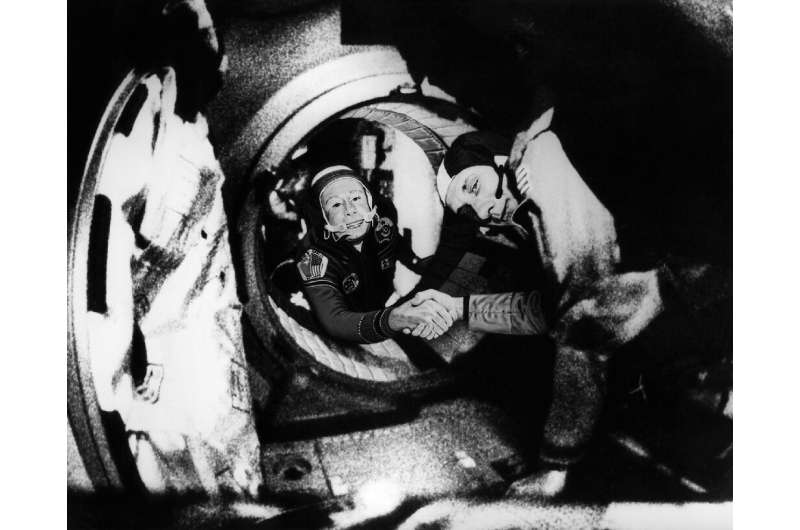First man to conduct spacewalk, Alexei Leonov, dies

Alexei Leonov, a legendary Soviet cosmonaut who was the first man to perform a spacewalk in 1965, died in Moscow on Friday aged 85 after a long illness.
The Russian space agency Roscosmos said it was saddened to announce the death of "cosmonaut No 11" who was twice decorated with the country's top honour, the Hero of the Soviet Union.
Tributes poured in from across the globe, with Western space agencies and experts praising Leonov's contribution and admirers bidding him farewell.
"This is a loss for the whole planet," said Russian cosmonaut Oleg Kononenko.
Leonov's assistant Natalia Filimonova told AFP that he died at Moscow's Burdenko hospital after a long illness.
Russian President Vladimir Putin sent his condolences to Leonov's widow and daughter, calling him a "true trailblazer" and a "heroic person."
"They knew each other very well," Kremlin spokesman Dmitry Peskov said. "Putin always admired Leonov's courage."
Canadian astronaut Chris Hadfield wrote on Twitter: "One of the finest people I have ever known. Alexei Arkhipovich Leonov, artist, leader, spacewalker and friend, I salute you."
NASA and the European Space Agency both praised the pioneering cosmonaut.

"His venture into the vacuum of space began the history of extravehicular activity that makes today's @Space_Station maintenance possible," NASA said on Twitter.
Leonov became a legend at home and his feats were immortalised in cinema and literature.
Stanley Kubrick's 1968 film "2001: A Space Odyssey" included recordings of Leonov's breathing in space.
The 1965 mission was also celebrated in a 2017 Russian film "The Spacewalker" where Leonov acted as consultant.
A crater on the far side of the Moon was named after Leonov in 1970.
'Earth was beautiful'
Born in Siberia, the youngest of eight children, Leonov became a fighter pilot before being selected as one of the first potential cosmonauts. He was a friend of Yuri Gagarin, who became the first man in space in 1961 and trained with him.
He was selected to perform the first spacewalk as the Soviet Union and United States, Cold War foes, were locked in a frantic race to conquer space.
After 18 months of intensive training Leonov was ready to become the first man to float in space.

On March 18, 1965, at the age of 30, he made history when he left a spacecraft during the Voskhod 2 mission for a spacewalk that lasted 12 minutes and nine seconds.
"(There was) an inky black, stars everywhere and the sun so bright I could barely stand it," Leonov told AFP in 2015 interview when he was a sprightly 80-year-old.
Tethered to the craft with a five-metre (16-foot) long cord, he gazed in wonder at Earth's geography laid out sweepingly below him.
"I filmed the Earth, perfectly round, the Caucasus, Crimea, the Volga. It was beautiful."
Leonov and another cosmonaut, pilot Pavel Belyayev, orbited at a distance of 500 kilometres (310 miles) from Earth.
They completed the first ever spacewalk 10 weeks before the United States repeated the feat.
Their mission was declared successful even though Leonov experienced several mishaps.
Their return to Earth nearly ended in tragedy when Leonov and Belyayev were forced to crash land in a forest some 180 kilometres (111 miles) from the Urals city of Perm.
The crew was discovered four hours later and rescued only in two days as it was an ordeal to reach them.

Tribute in outer space
A decade later in 1975 Leonov commanded the Soyuz 19 spacecraft which docked with the US Apollo spacecraft in the first joint space mission between the Soviet Union and the United States.
Leonov celebrated his 85th birthday on May 30 and cosmonauts Kononenko and Alexei Ovchinin dedicated a May spacewalk to him, taking a picture of him into space and wearing spacesuits with birthday greetings written on the back.
Putin also congratulated Leonov at the time, calling him "a worthy representative of the legendary team of Soviet cosmonauts".
Leonov was an accomplished artist and writer and his contemporaries described him as warm and likable. He is survived by his widow Svetlana and his younger daughter Oksana.
"It's a huge tragedy for us all," said the wife of fellow cosmonaut Boris Volynov, Tamara Volynova.
"Alexei is a unique person," she told AFP.
He helped many cosmonauts and was a "great storyteller", space historian Alexander Glushko said.
He also helped US astronaut Tom Stafford adopt two Russian boys.
Leonov will be laid to rest at a cemetery just outside Moscow on Tuesday.
Awe and fear: how Russian cosmonaut recalled first spacewalk
Alexei Leonov, the first man to do a space walk, died at the age of 85 on Friday. Here AFP republishes an interview with the cosmonaut from 2015, conducted on the 50th anniversary of his extraordinary achievement:
Fifty years after Alexei Leonov carried out the first spacewalk, he still vividly recalls the moment he emerged from the capsule to become the only human to have floated in the cosmos.
"I gently pulled myself out and kicked off from the vessel," former cosmonaut Leonov, a sprightly 80-year-old working for a Moscow bank, told AFP.
"(There was) an inky black, stars everywhere and the sun so bright I could barely stand it."
Tethered to the craft with a five-metre (16-foot) long cord, he gazed in wonder at Earth's geography laid out sweepingly below him, his motherland perfectly visible.
"I filmed the Earth, perfectly round, the Caucasus, Crimea, the Volga. It was beautiful."
The historic moment on March 18, 1965 came as the Soviet Union and United States, Cold War foes on Earth, were locked in a frantic race to conquer space.
With the Americans preparing for their own spacewalk, Leonov and pilot Pavel Belyayev (codenames Almaz-1 and Almaz-2) were rocketed almost 500 kilometres (310 miles) into orbit.
Back on the surface, millions followed the mission as it was beamed live on radio and television.
As the minutes passed outside the spacecraft Leonov heard his pilot report back to Earth: "This is Almaz-1: Man has gone out into space."
Then he heard Yuri Levitan, a famous Soviet radio presenter, saying the same thing. "But who are they talking about?" he thought to himself.
'It had to be done'
Leonov's 12 minutes in space were the result of years of frantic work as the USSR struggled feverishly to keep ahead of America in the contest for outer space.
In 1962, some 12 months after cosmonaut Yuri Gagarin became the first person to orbit Earth, the Soviets had set themselves a new objective: "Swimming in space like a sailor in the ocean".
Eventually space chief Sergei Korolyov saw in Leonov the qualities he wanted and handpicked the cosmonaut to carry out the historic mission.
"Korolyov chose me because I had already piloted several aircraft, I scored highly and I could paint, which is rare among cosmonauts," smiled the man who would go on to draw sought-after works of art depicting outer space.
After 18 months of intensive training Leonov was finally ready to become the first man to drift through space.
However the Voskhod 2 spacecraft that was to take him there was not.
"The spacecraft had no ejection system," he said. "We would either have to wait nine months to revamp it or use this model. We chose the second option."
But with the Americans hot on their heels—NASA was hard at work preparing astronaut Ed White for a spacewalk—there was no time to waste.
"It wasn't about courage. We just knew it had to be done," said Leonov.
Near disaster
But after the initial triumph nearly came disaster.
As he floated in the cosmos, Leonov said the euphoria of making man's first spacewalk quickly gave way to anxiety.
With their orbit quickly taking them away from the sun and into darkness, it was soon time to get back into the vessel, but Leonov realised his spacesuit had inflated and become deformed due to the lack of atmospheric pressure, which could prevent him from slipping back inside the airlock.
Leonov didn't wait to discuss the problem with the control centre, but decided to reduce pressure by bleeding off some of the oxygen in his suit, risking oxygen starvation.
With great difficulty he managed to pull himself into the airlock head first, instead of feet first. The complicated manoeuvres left him drenched in sweat and he lost six kilos (13 pounds) in the 12-minute outing.
But it was only the start of the daunting challenges that awaited them.
Back in the cabin the team realised the automatic guidance system for reentry was not working properly and they would have to manually guide the spacecraft back to Earth.
In his book on the space race, Leonov described in more detail how the landing module failed to separate from the orbital module, creating massive G-forces as they spun wildly around the cable, hurtling towards Earth.
They landed safely but they were 2,000 kilometres from Kazakhstan where they were supposed to end up, in deep snow in a taiga forest in the Ural Mountains, home to wolves and bears.
"We waited three days in the forest to be rescued, and Soviet radio reported we were on holiday after the flight," Leonov said, laughing.
Rescuers lowered a large cauldron in a helicopter to be filled with snow and heated to provide a hot bath for the space adventurers.
Welcomed back as heroes, Leonov and Belyayev completed man's first spacewalk 10 weeks before the United States.
A decade later in 1975 Leonov commanded the Soyuz 19 in the first joint space mission between the Soviet Union and the United States.
As ties between Moscow and Washington have again frayed over the Ukraine conflict, Leonov offered a few solemn words of wisdom.
"There have never been frontiers between astronauts. The day that this notion sinks into the minds of politicians, our planet will be different."
© 2019 AFP



















